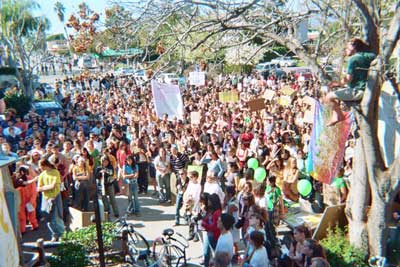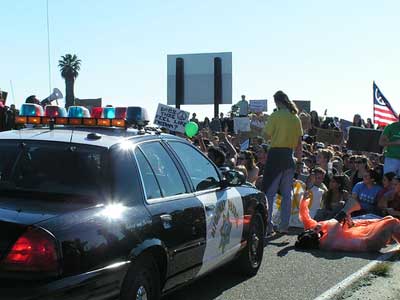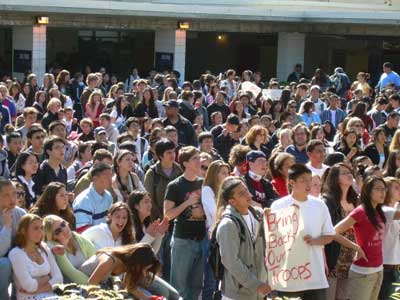Revolution #79, February 25, 2007
Feb. 15: Nationwide Student Strikes Against the U.S. War in Iraq
“Who will forgive us if we choose to close our eyes and wait until it’s all over? Please, do not continue to rely on elected representatives who don’t care about you. This strike is not about 'who will listen to us?' It’s about actively fashioning the world in which we want to live.”
Statement from a student,
February 15, 2007 in the Daily Nexus,
University of California, Santa Barbara (UCSB) student newspaper
On February 15, students on over 20 campuses across the country held student strikes and actions to protest the U.S. war in Iraq. This date was chosen to commemorate the 4th anniversary of the largest anti-war protests in U.S. history, at the start of the Iraq War.
|
At the University of California, Santa Barbara, students rallied and marched down a major highway to the airport, where they had a two-hour stand-off with police. The call for a student strike against the war originated at UCSB in the context of a struggle against the university’s participation in developing weapons for the U.S. military. It was endorsed by many professors, along with the student government and the entire Women's Studies department. Howard Zinn and Noam Chomsky gave their support. And, nationwide, World Can't Wait! Drive Out the Bush Regime! took up the call from the students and helped to organize strikes and actions on a number of campuses.
At Lowell High, the oldest and largest public high school in San Francisco, 700 students walked out. And students from Berkeley High School and Fremont High in Oakland went to UC Berkeley where 300 students rallied. Sonoma State University held a three-day campout against the war, which culminated with a rally of 300. At Occidental College in Southern California, near Los Angeles, 400 students attended a teach-in. At University of California Davis, 300 students marched.
At Columbia College in Chicago, 200-300 students participated in an all-day rally. At Columbia University in New York, the crowd of 400 students who rallied included students from Barnard College, New York University, and the City College of New York, as well as students from Beacon High School and Eleanor Roosevelt High School. And students held marches through the campus at Emerson College and Suffolk University in Boston. Detailed reports from schools across the country can be found at worldcantwait.net.
In the weeks leading up to February 15, students wrote calls to strike, expressing outrage at the escalation of the war, torture, repression, and threat of attack on Iran. The call at Columbia College in Chicago states, "As the Bush administration is gearing up for an attack of Iran, waiting two more years for this to stop is unconscionable. We will no longer go on with business as usual as if this is not happening." At Occidental College the students' demands included an end to torture, reversing the Patriot Act, and “no attack on Iran.”
A lot of struggle and debate occurred nationwide around these strikes. Building up to the day, the Columbia University campus was abuzz with talk about the war and whether to strike and there were articles on the strike almost every day for two weeks in the Columbia Spectator, the main student newspaper. At UCSB, the Daily Nexus ran several editorials from students making compelling arguments about the situation in the world and the impact the strike could have. The San Francisco Chronicle reported that the three-day campout at Sonoma State included a workshop attended by 30-50 students which one organizer said was "to talk about what kind of a world we want to live in."
In many cases there was support from faculty. At the University of Chicago, Bruce Lincoln, a professor of the History of Religion, canceled his classes in support of the strike and encouraged others to do the same. Faculty at Columbia College in Chicago brought their classes to the rally. At UC Santa Barbara, the Women’s Studies Department was closed for the day. At Columbia University, professors spoke at the rally, including a Women's Studies professor who exposed the lie that women have been liberated by the U.S. going into Afghanistan and Iraq. A professor of literature from the Department of Middle East and Asian Languages and Cultures said in his speech that every professor who did not cancel their classes for this should be challenged.
For many campuses this was the largest show of political resistance in years. A member of the World Can't Wait student chapter at San Francisco State said, "Students felt empowered. It's like we actually have a voice." A Columbia University student who attended the rally said, "I think student activism can play a critical role in the anti-war movement. We can't just wait for 2008 and a new president to end this unjust occupation."
As the immoral and criminal war escalates in Iraq and as Bush threatens to attack Iran, the seriousness of the challenge and the consequences for the people of the world are highly intensified and these student strikes were a powerful challenge on campuses across the country, showing the potential for even more determined protest and resistance.
If you like this article, subscribe, donate to and sustain Revolution newspaper.






